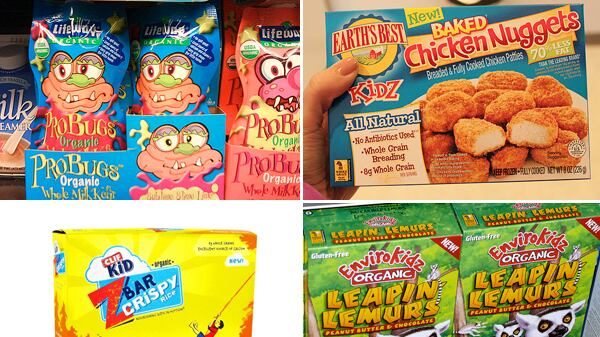Among the myriad decisions parents must make every day, one seems like a safe, if costly, bet: feeding your kids organic. And according to a survey released last month from the Organic Trade Association, parents are making this choice more than ever. Seventy-eight percent of U.S. families now report buying organic food, up from 73 percent in 2009. Four in 10 families say they’re buying more organic products than they did a year ago, and the top reason parents give for doing so is that it’s “healthier for me and my children.”
What these parents may not realize, however, is that many of the seemingly healthy snacks and meals they pile into their carts at Whole Foods are no better than the standard supermarket products they shun, despite the hefty price tags and pastoral packaging. In fact, many “are not whole or real,” says Nina Planck, author of Real Food for Mother and Baby, but “low-nutrition, high-profit-margin products.”
Indeed, despite being regulated by the USDA, food labels can be deceptive. A product may be labeled “organic,” but without the phrase “100 percent organic,” it can contain up to 30 percent nonorganic substances. Even ingredients that are organic are often highly processed and unhealthy (organic evaporated cane syrup, I’m looking at you). And “all natural,” as many are now aware, is all but meaningless.
“There is so much on the market right now targeting parents who want to do the right thing,” says Dana Davis, a registered dietician at New York University’s Department of Nutrition, Food Studies, and Public Health. “Kid products in particular have highly misleading health claims—parents have to educate themselves.”
Just as troubling as mystery ingredients are the methods used to produce and store the puffs, bars, powders, and gels marketed for kids today. While they're convenient, producing them involves extreme heat and pressure, which can break down the ingredients to such an extent that kids digest them very differently from real foods. Your toddler’s green spinach puffs may fool your eyes, but they aren’t fooling his body.
“Our culture tells us that a cup of rice is the same, whether served hot from the stove or as a rice cake,” says Jill Gusman, owner of Simply Natural, a wellness-consulting company (and, full disclosure, my instructor at the Natural Gourmet Institute in Manhattan), “but these puffed, processed products have been ‘denatured’ by manufacturing. As a result, they wreak havoc on our digestion and are almost devoid of nutritional value.”

Before you stock up on organic goodies for the new year, consider this list of some of the latest kid products to hit supermarket shelves; most are little more than junk foods in ecofriendly clothing. And if you really want to be healthy? Forget packaged snacks altogether, and serve your kids the real whole-food alternatives suggested.






